人教版七年级下Unit 10 I’d like some noodles. Section B词汇课件(共10张PPT)
文档属性
| 名称 | 人教版七年级下Unit 10 I’d like some noodles. Section B词汇课件(共10张PPT) |
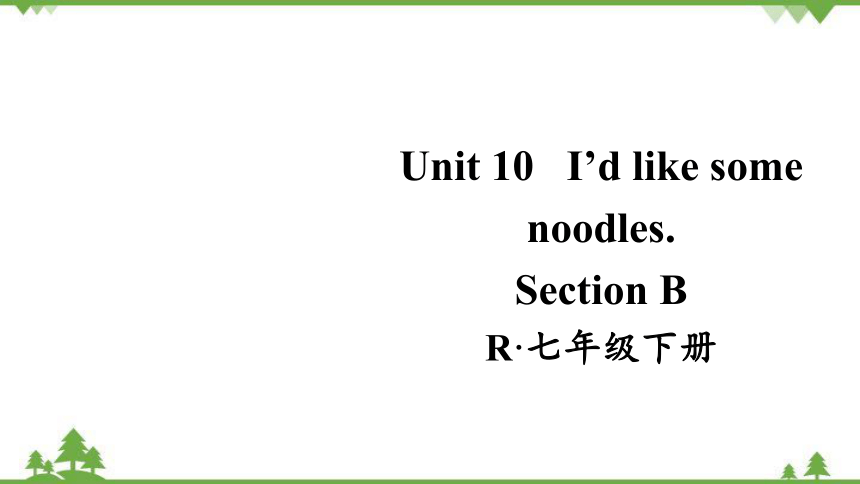
|
|
| 格式 | pptx | ||
| 文件大小 | 7.4MB | ||
| 资源类型 | 教案 | ||
| 版本资源 | 人教新目标(Go for it)版 | ||
| 科目 | 英语 | ||
| 更新时间 | 2022-06-10 00:00:00 | ||
图片预览

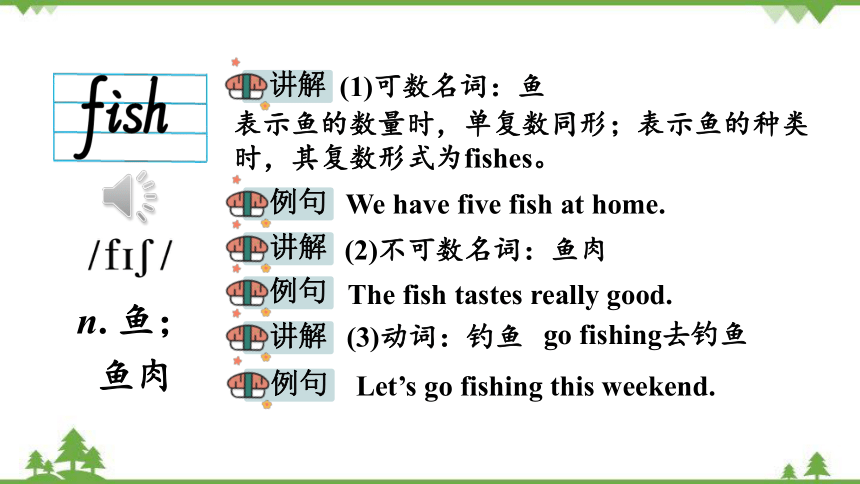
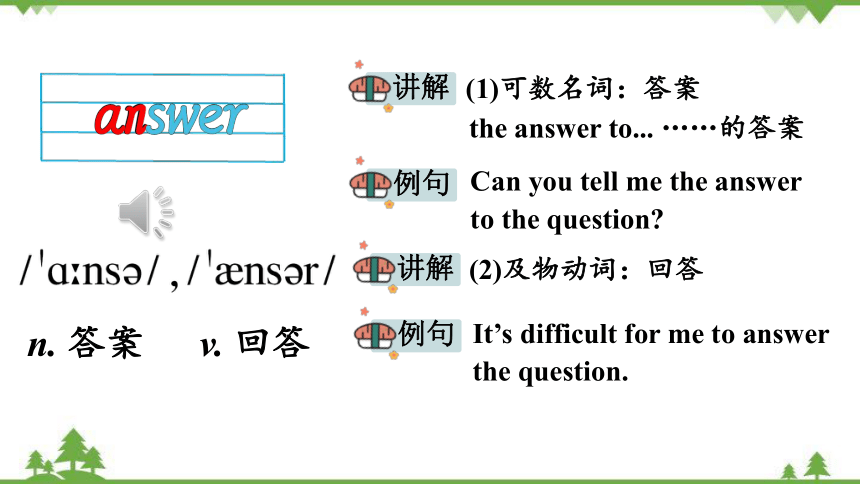
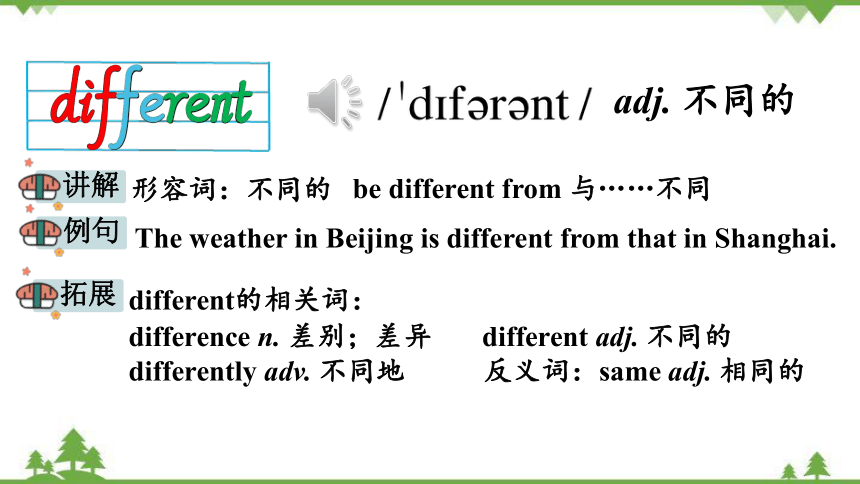
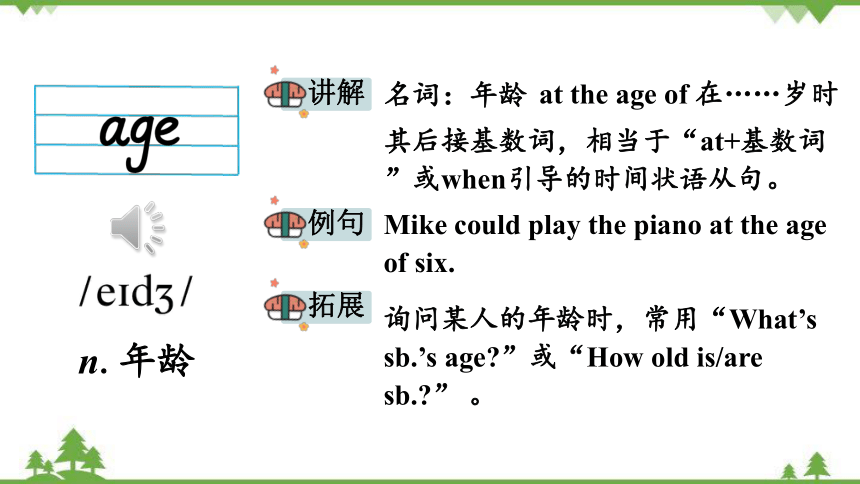
文档简介
(共10张PPT)
Unit 10 I’d like some noodles.
Section B
R·七年级下册
(1)可数名词:鱼
We have five fish at home.
表示鱼的数量时,单复数同形;表示鱼的种类时,其复数形式为fishes。
(2)不可数名词:鱼肉
The fish tastes really good.
(3)动词:钓鱼
go fishing去钓鱼
Let’s go fishing this weekend.
n. 鱼;
鱼肉
讲解
例句
讲解
例句
讲解
例句
(1)可数名词:答案
Can you tell me the answer to the question
the answer to... ……的答案
(2)及物动词:回答
It’s difficult for me to answer the question.
n. 答案 v. 回答
讲解
例句
讲解
例句
形容词:不同的
The weather in Beijing is different from that in Shanghai.
be different from 与……不同
different的相关词:
difference n. 差别;差异 different adj. 不同的
differently adv. 不同地 反义词:same adj. 相同的
adj. 不同的
讲解
例句
拓展
名词:年龄
其后接基数词,相当于“at+基数词”或when引导的时间状语从句。
at the age of 在……岁时
询问某人的年龄时,常用“What’s sb.’s age ”或“How old is/are sb. ” 。
Mike could play the piano at the age of six.
n.年龄
讲解
例句
拓展
动词:吹
是“动词+副词”型短语。当名词作其宾语时,名词可放在blow和out之间,也可放在out之后;当人称代词作其宾语时,人称代词必须放在blow和out之间。
blow out 吹灭
The wind is blowing hard outside.
It’s time to blow out the candles.
v.吹
讲解
例句
情态动词:将要;会
They will practice playing the violin after school.
I will not go boating tomorrow.
后接动词原形,常用于一般将来时中。
v.将要;会
讲解
例句
形容词:幸运的
Some people think eight is a lucky number.
I’m very lucky to have a friend like him.
在句中常作定语或表语。
be lucky to do sth. 有幸做某事
由“luck(n.幸运;运气)+形容词后缀-y”构成。
adj.幸运的
讲解
构成
例句
形容词:受欢迎的;普遍的
Gongbao chicken is a popular dish.
The artist is popular around the world.
The phones with 5G are getting popular now.
get popular 受欢迎;流行
be popular with... 受到……的欢迎
在句中常作定语或表语。
adj. 受欢迎的;普遍的
讲解
短语
例句
可数名词:想法;主意
My idea is different from his.
(1) Good idea!/That’s a good idea!
好主意!/那是个好主意!
用于对别人提出的建议或想法表示赞同。
(2) I have no idea. 我不知道。相当于
“I don’t know.”。
v.想法;主意
讲解
例句
拓展
Unit 10 I’d like some noodles.
Section B
R·七年级下册
(1)可数名词:鱼
We have five fish at home.
表示鱼的数量时,单复数同形;表示鱼的种类时,其复数形式为fishes。
(2)不可数名词:鱼肉
The fish tastes really good.
(3)动词:钓鱼
go fishing去钓鱼
Let’s go fishing this weekend.
n. 鱼;
鱼肉
讲解
例句
讲解
例句
讲解
例句
(1)可数名词:答案
Can you tell me the answer to the question
the answer to... ……的答案
(2)及物动词:回答
It’s difficult for me to answer the question.
n. 答案 v. 回答
讲解
例句
讲解
例句
形容词:不同的
The weather in Beijing is different from that in Shanghai.
be different from 与……不同
different的相关词:
difference n. 差别;差异 different adj. 不同的
differently adv. 不同地 反义词:same adj. 相同的
adj. 不同的
讲解
例句
拓展
名词:年龄
其后接基数词,相当于“at+基数词”或when引导的时间状语从句。
at the age of 在……岁时
询问某人的年龄时,常用“What’s sb.’s age ”或“How old is/are sb. ” 。
Mike could play the piano at the age of six.
n.年龄
讲解
例句
拓展
动词:吹
是“动词+副词”型短语。当名词作其宾语时,名词可放在blow和out之间,也可放在out之后;当人称代词作其宾语时,人称代词必须放在blow和out之间。
blow out 吹灭
The wind is blowing hard outside.
It’s time to blow out the candles.
v.吹
讲解
例句
情态动词:将要;会
They will practice playing the violin after school.
I will not go boating tomorrow.
后接动词原形,常用于一般将来时中。
v.将要;会
讲解
例句
形容词:幸运的
Some people think eight is a lucky number.
I’m very lucky to have a friend like him.
在句中常作定语或表语。
be lucky to do sth. 有幸做某事
由“luck(n.幸运;运气)+形容词后缀-y”构成。
adj.幸运的
讲解
构成
例句
形容词:受欢迎的;普遍的
Gongbao chicken is a popular dish.
The artist is popular around the world.
The phones with 5G are getting popular now.
get popular 受欢迎;流行
be popular with... 受到……的欢迎
在句中常作定语或表语。
adj. 受欢迎的;普遍的
讲解
短语
例句
可数名词:想法;主意
My idea is different from his.
(1) Good idea!/That’s a good idea!
好主意!/那是个好主意!
用于对别人提出的建议或想法表示赞同。
(2) I have no idea. 我不知道。相当于
“I don’t know.”。
v.想法;主意
讲解
例句
拓展
同课章节目录
- Unit 1 Can you play the guitar?
- Section A
- Section B
- Unit 2 What time do you go to school?
- Section A
- Section B
- Unit 3 How do you get to school?
- Section A
- Section B
- Unit 4 Don't eat in class.
- Section A
- Section B
- Unit 5 Why do you like pandas?
- Section A
- Section B
- Unit 6 I'm watching TV.
- Section A
- Section B
- Review of Units 1-6
- Unit 7 It's raining!
- Section A
- Section B
- Unit 8 Is there a post office near here?
- Section A
- Section B
- Unit 9 What does he look like?
- Section A
- Section B
- Unit 10 I'd like some noodles.
- Section A
- Section B
- Unit 11 How was your school trip?
- Section A
- Section B
- Unit 12 What did you do last weekend?
- Section A
- Section B
